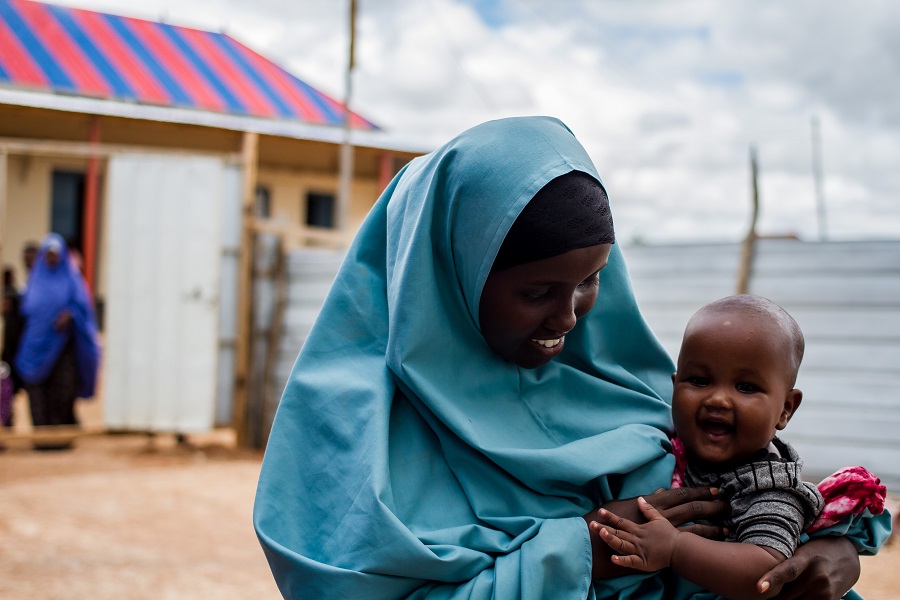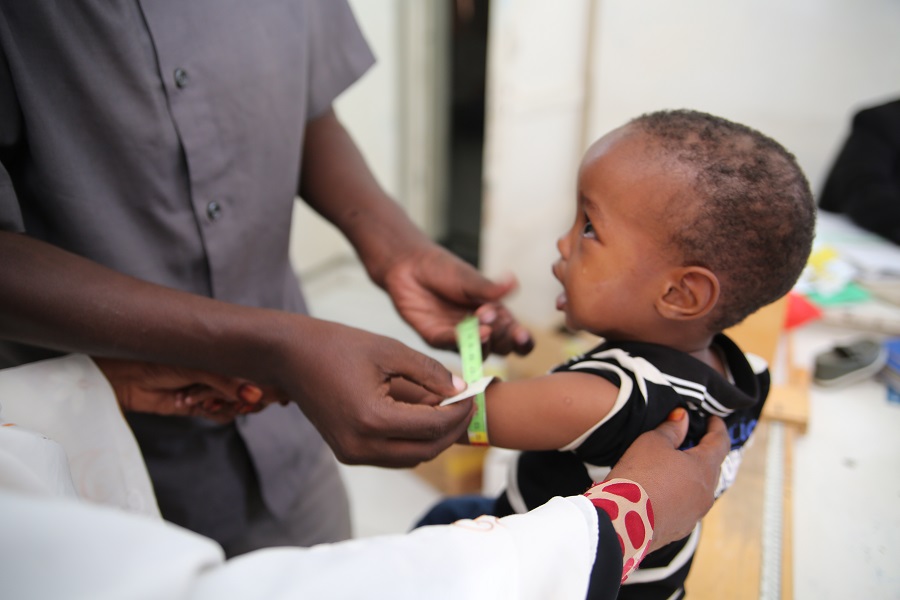
16 September 2021 – As the Head of Nurses and Midwives and Capacity Building at the Banadir Hospital, Sahra Mire Mohamed assists midwives to offer mothers and newborns safe and quality care. She ensures that midwives she trains perform safe deliveries, supervises regular mother and child health services offered to mothers and newborns, and helps them when needed, especially if a mother or child is facing any kind of health risk or medical emergency.
On average, Sahra and her teams work with 600 pregnant women a week, many of whom come from far and wide to visit the hospital because treatment for pregnant women in this hospital is free. Mostly, women visit for delivery, although many “expectant mothers” arrive too late to the hospitals and it becomes difficult for the midwives to manage these pregnant women for safe delivery. Sometimes, the family members do not sign a consent form for a caesarian section in the event when normal deliveries are not indicated, owing to the condition of the mother, she explains.
For now, Sahra is pleased to note that this year’s World Patient Safety Day is shining a spotlight on safe maternal and newborn care, and urging policy-makers, health professionals, the general public, health partners and other stakeholders to ‘act now for safe and respectful childbirth’.
With very high maternal mortality and neonatal mortality rates, stakeholders in Somalia need to focus on using innovative strategies to create a safe environment for mothers and newborns, she says.
Challenges that Somali women and newborns face
In Somalia, health facilities do not practise proper infection prevention and control measures leading to patients, health care workers, and even newborns, prone to health care-associated infections. The awareness levels of health care workers on infection prevention and control in many health facilities is also very poor.
According to Sahra, who has a earned Master’s degrees in both public health and one in disaster resilience leadership and humanitarian assistance, Somali women receive unsafe care when they opt to visit unskilled traditional birth attendants for delivery. In general, women lack awareness about the need to visit health facilities regularly during their pregnancies, which results in them and their newborns missing out on life-saving vaccinations and screenings that can spot and prevent challenges.
Many pregnant women that Sahra sees suffer from pre-eclampsia, excessive bleeding during and after childbirth, high blood pressure, obstructed labour and other complications that arise due to unsafe care during delivery, poor antenatal and postnatal care and also partly due to practice of female genital mutilation.
Need for health education
To reduce maternal and neonatal deaths and diseases, women should speak to health care workers and their families about how to access health care and reduce risks during pregnancy and childbirth. They need to be aware of the regular check-ups, screening for diseases, and immunization needed during pregnancy to avoid infection during births, and to recognize any red flags in good time to seek timely, life-saving interventions. Families and communities can learn about ways in which they can ensure pregnant women continue to access health services at facilities before childbirth, during delivery and as their children grow.
“We need to educate Somali health workers, as well as Somali women, on what makes a safe and respectful birth for newborns which also do not deny the right of every pregnant woman for safe deliveries across any health facility in this country. We can do it by working together with our partners. Our joint and collective commitment and actions in ensuring safe and respectful childbirth can save many lives — of both mothers and newborns — from preventable causes.” said Dr Mamunur Rahman Malik, the World Health Organization (WHO) Representative to Somalia.
He explained that communities should be aware of the timely and skilled care and emotional support mothers need for their deliveries and to give newborns a great start in life. "Mothers who receive the right antenatal care would be more likely to develop birth and emergency plans and avoid complications," added Dr Malik.
Sahra echoes these words, with a message to her fellow health care workers, adding, “When patients arrive at health facilities, we should give them care immediately and offer them a comfortable environment. It is up to us to give them relief, look at their safety, and adhere to patient safety guidelines when we attend to patients.”
Change is trickling in, but more needs to be done
On a brighter note, change is trickling in. The Ministry of Health and Human Services and health partners, including WHO and other UN agencies like the United Nations Children’s Fund (UNICEF) and United Nations Population Fund (UNFPA), are using various strategies to reduce maternal mortality, such as introducing new interventions like the kangaroo care, providing hospitals with personal protective equipment to reduce the spread of COVID-19, and training health care workers in maternal and neonatal care.
Additionally, health care workers based in health facilities are becoming more aware of and skilled at offering safe quality care and appropriate treatment when required. They are becoming more respectful and paying attention to patients’ needs, thus increasing the trust of families, including men, in the use of health services and facilities. However, more can be done.
Keeping mothers and children safe from COVID-19
In Hargeisa, Somaliland, Ismahan Abdullahi manages the Hawadlleh Mother and Child Health clinic. On average, she attends to around 100 patients a week, offering antenatal care, postnatal care and childbirth. She also offers advice on family planning to women.
When COVID-19 was confirmed, Ismahan and her colleagues noticed a reduction in the number of visits pregnant women were making to health facilities, most likely out of a fear of being infected with the disease. In response, Ismahan and her team have been working hard to maintain a safe environment at the clinic, as they know how important it is to keep mothers and children safe while they seek medical attention. Ismahan wears masks, washes her hands regularly, uses sanitizers, maintains physical distance when she can, and encourages patients and her team to do the same.
“Even though we are trying, we need support in getting personal protective equipment for health care workers,” says Ismahan. She explains that health facilities like the one she runs need support in many areas: in training of midwives, nurses, laboratory personnel and pharmacists; and in the provision of supplies such as laboratory solutions, family planning commodities, health kits for deliveries. Training in infection prevention and control would also save many lives, Ismahan adds.
Back in Mogadishu, Sahra raises the same point – that midwives and health professionals need intense training in different areas, and Somali women need support from their communities to raise healthy families.
Giving newborns a good start in life

To give newborns a safe start in life, WHO recommends that midwives and nurses should support with immediate and thorough drying of babies after childbirth; delayed clamping of the umbilical cord and bathing; proper handling of non-breathing babies; and must encourage early initiation of breastfeeding.
“Good care during pregnancy is essential for the health of both the mother and developing unborn baby. Pregnancy is a crucial time to promote health behaviours, to ensure that the baby is getting all the nutrients needed for proper growth and development,” said Dr Al-umra Umar, Head of WHO Somalia’s Reproductive, Maternal, Newborn and Child Health Programme.
This year, on the World Patient Safety Day, WHO, UNICEF and UNFPA are committing to support the Federal Ministry of Health and Human Services to introduce new interventions and measures across the health facilities in Somalia to ensure safer maternal and newborn care every year.


